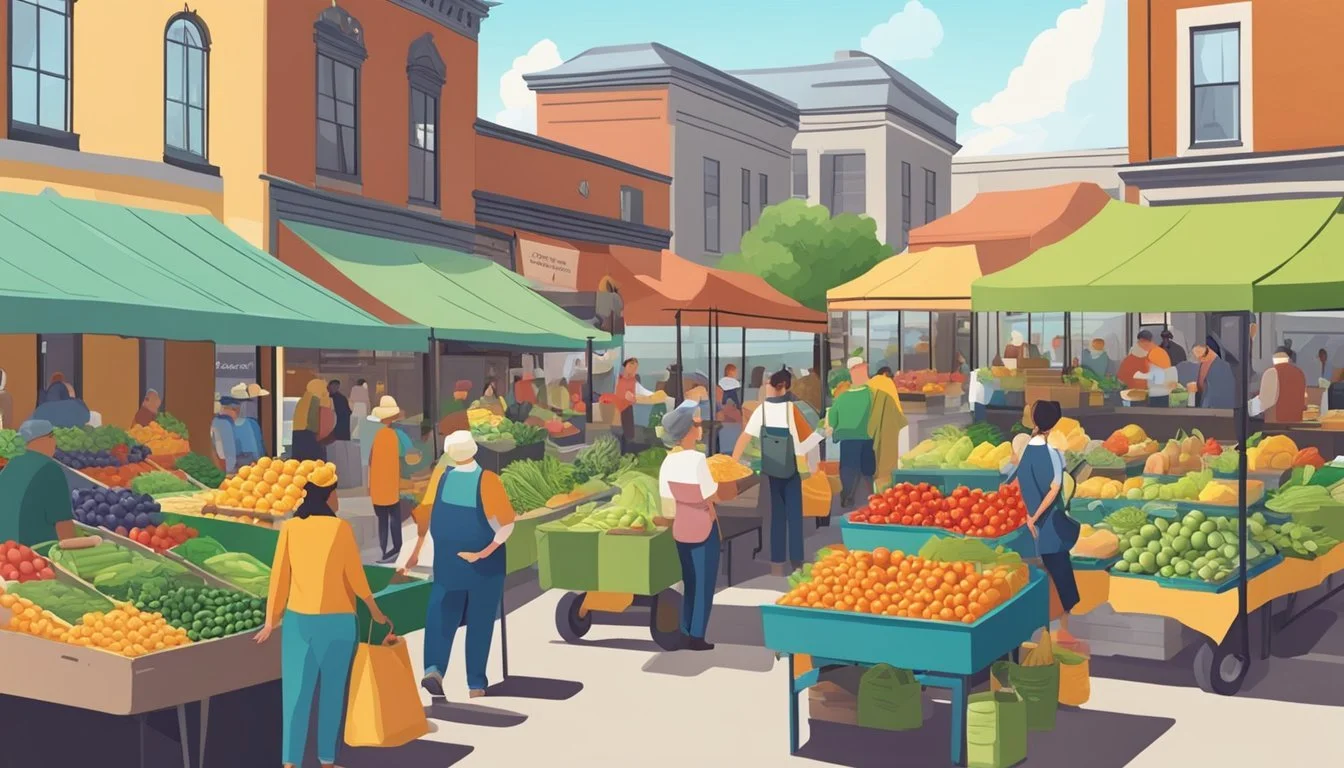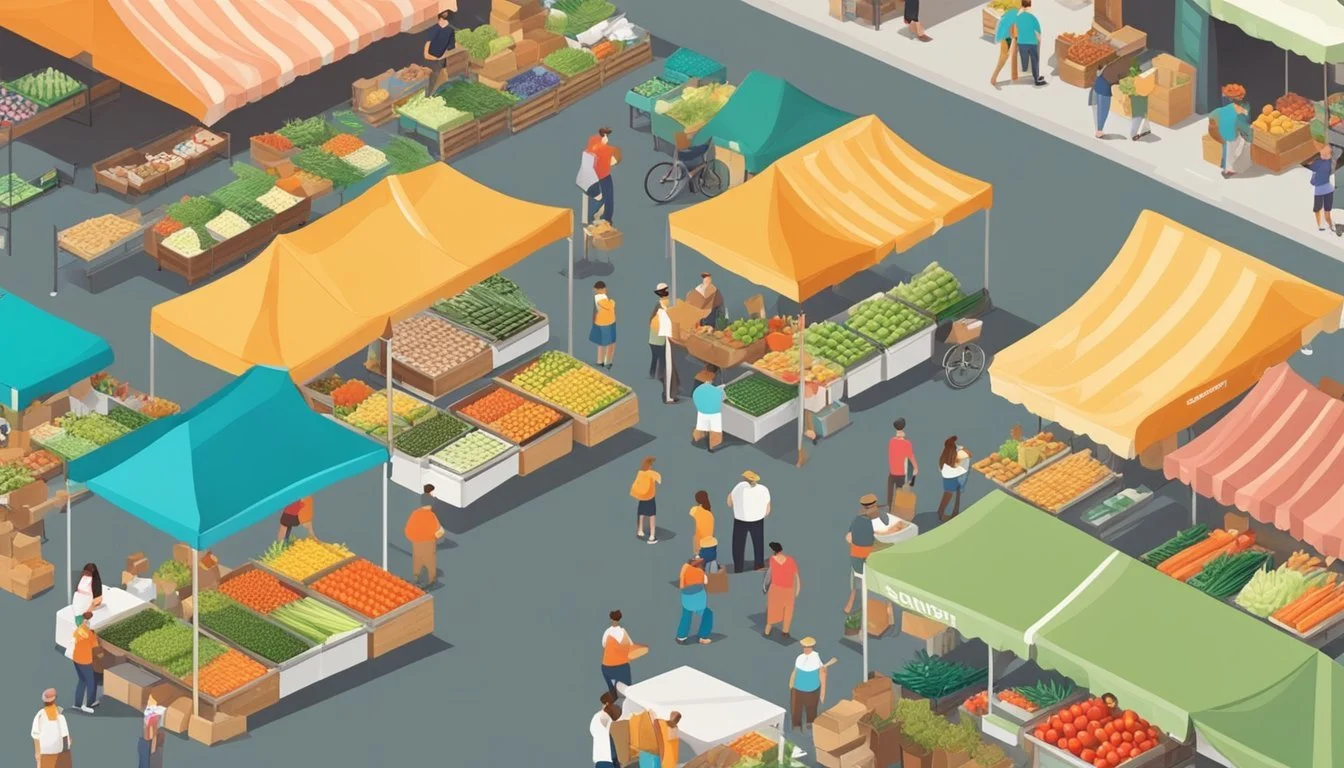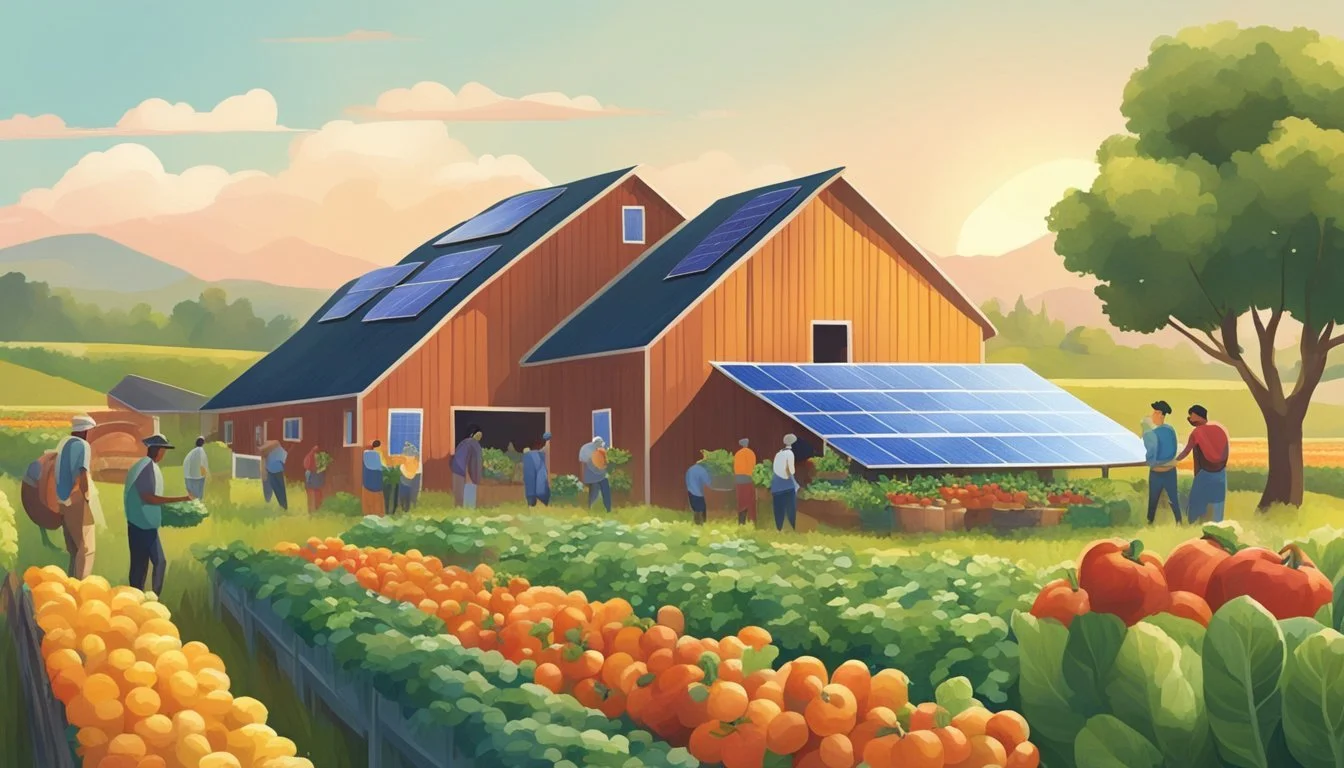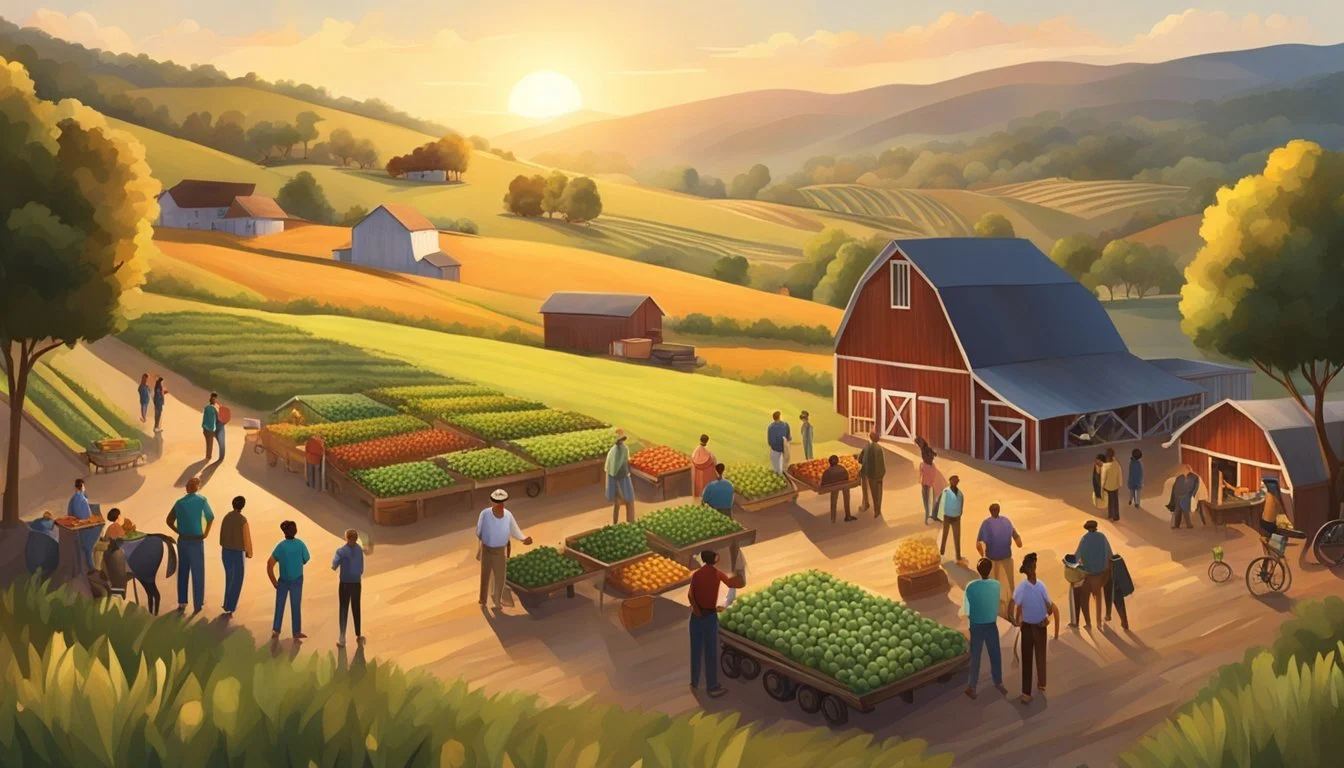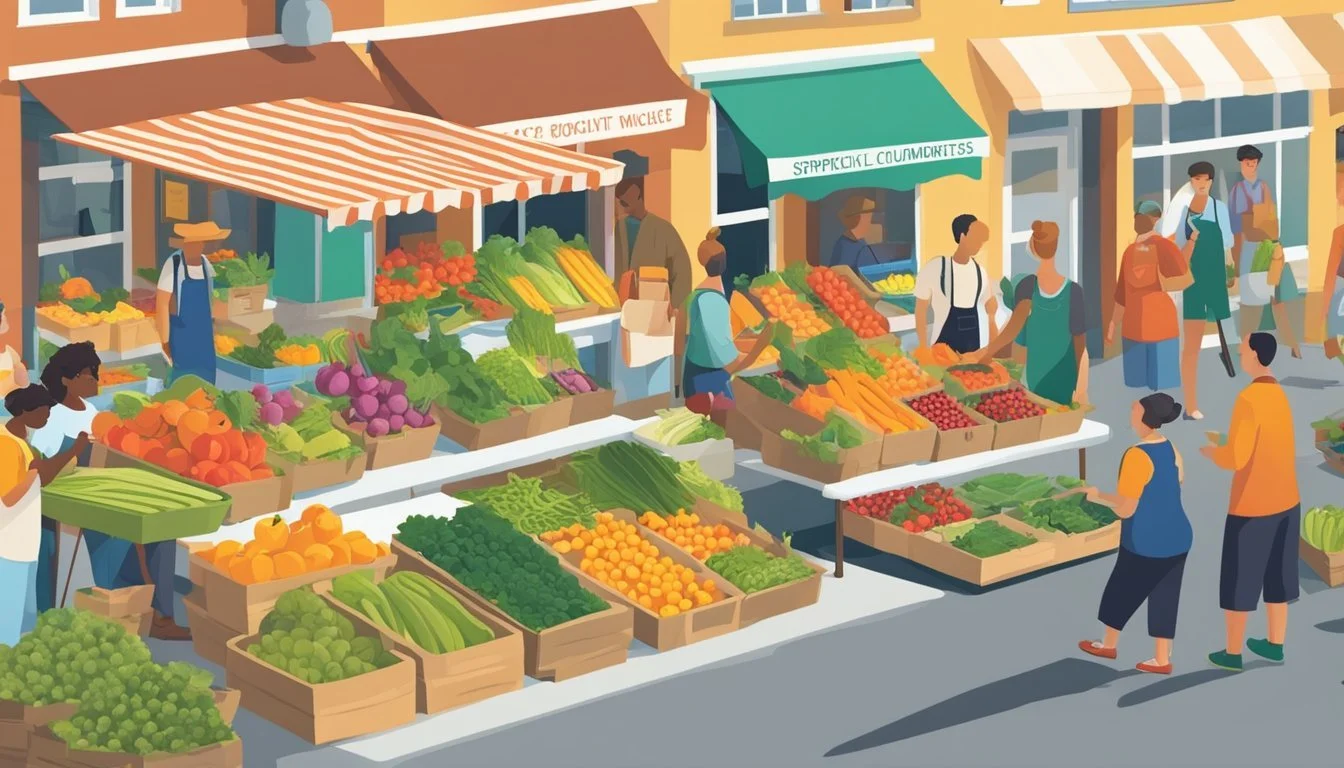Community Supported Agriculture (CSA) in Springfield, IL
Benefits and Local Options
Community Supported Agriculture, commonly known as CSA, is a thriving and crucial part of the agricultural landscape in Springfield, IL. It serves as a model for a symbiotic relationship between local farmers and consumers. By purchasing shares in the farm's upcoming harvest, community members in Springfield have a direct connection to their food source, obtaining seasonal produce and often other farm products. This system not only supports the viability of small farms but also encourages sustainable and environmentally friendly farming practices.
In Springfield, the CSA model not only provides residents with access to fresh, locally grown produce but also fosters a sense of community and partnership. Through CSAs, consumers become active participants in the agricultural process, sharing in the risks and rewards of farming. The impact of this model is evident in the strong support local farms receive, underscoring the community's commitment to supporting local agriculture and ensuring its resilience against the challenges faced by smaller-scale operations.
With a range of CSA programs, Springfield's residents have the opportunity to enjoy a diverse selection of produce throughout the year. From vegetables and fruits to herbs and flowers, these programs offer a direct avenue for consumers to invest in their health, community, and local economy, all while reaping the benefits of high-quality, farm-to-table goods.
Understanding CSA
The concept of Community Supported Agriculture, or CSA, revolves around the symbiotic relationship between local farms and community members who receive fresh, seasonal produce through a subscription-based model.
Basics of CSA
CSA is a partnership between farmers and community members that provides a direct link between the production and consumption of food. In this model, individuals or families purchase a subscription, or farm share, prior to the growing season. Here's a simple breakdown:
CSA Share: A portion of the farm's harvest delivered regularly during the growing season.
Subscription-Based: Members pay upfront, which funds the farm's operations.
Seasonal Produce: Shares typically include a variety of fresh produce that is harvested at peak season.
By creating a sustainable financial model, CSAs ensure that local agriculture thrives while delivering nutritionally rich, fresh produce directly to consumers.
Benefits of Joining a CSA
Joining a CSA comes with numerous advantages:
Support Local Farmers: Your membership is an investment in local agriculture.
Enjoy Fresh and Organic Vegetables: Typically, CSA farms provide organic or sustainably-farmed produce that is packed with nutritional value.
Experience Seasonal Eating: CSAs offer the opportunity to explore a diet based on seasonal, local produce.
Sustainable Practices: By participating, members promote sustainable farming practices.
Sense of Community: This model fosters a stronger sense of community through direct relationships with the people growing your food.
Given these benefits, CSA members not only enjoy regular deliveries of fresh goods but also take an active role in supporting and sustaining the local farm ecosystem.
CSA Offerings in Springfield
Community Supported Agriculture in Springfield offers a rich variety of farm products including fresh fruits, vegetables, and additional items like dairy and meats. Subscribers can opt for weekly or monthly shares that support local agriculture.
Types of Products Available
Springfield's CSA programs predominantly offer a range of vegetables and fruits that are seasonal and freshly picked. Members can look forward to weekly baskets filled with produce directly from the host farms to their tables.
Fruit and Vegetable Variety
The CSA shares in Springfield are known for their diverse variety of fruit and vegetables. This includes staples like tomatoes, peppers, and leafy greens, along with unique options such as heirloom varieties that are often not available in traditional grocery stores.
Additional Farm Products
Alongside produce, Springfield CSAs often feature additional farm products. These can include:
Eggs: Fresh from the farm, often from free-range chickens.
Meats: Options such as pasture-raised pork, lamb, goat, and poultry are available.
Dairy: A selection of dairy items like cheese may be part of the CSA offerings.
Others: Farms may also provide homemade jams, honey, and occasionally items like fresh-cut flowers or locally roasted coffee.
Getting Involved
For individuals looking to support local agriculture and become an integral part of the food cycle in Springfield, IL, getting involved with a CSA is a transparent and rewarding pathway.
How to Become a Member
To join a Community Supported Agriculture (CSA) program, prospective members typically select from available shares at the beginning of the growing season. Shares often consist of a weekly or bi-weekly allotment of fresh produce that is either picked up from a designated location or, in some instances, delivered. Membership may require an upfront commitment, which often supports the farmer’s operational costs for the season.
Steps to Membership:
Research: Identify local CSAs and understand their offered shares.
Contact: Reach out to the CSA to inquire about availability for the season.
Commit: Secure your portion with any required payment plans.
Engage: Participate in community events and enjoy the seasonal produce.
Understanding Seasonal Shares
Seasonal shares are the cornerstone of CSA programs, providing shareholders with a variety of fresh produce throughout the assigned period — commonly the local growing season. Members can typically choose from different share sizes, which may include individual, couple, or family-sized portions providing a weekly or monthly supply of produce.
Share Features:
Freshness: Guaranteed fresh, locally grown fruits and vegetables.
Recipes: Often accompanied by recipes suited for the seasonal produce.
Payment Plans: Some CSAs offer flexible payment plans or discounts.
Pickup/Delivery Options: Regular pickup at a farm stand or local market, some offer delivery.
Community Impact: Investment in CSAs supports the local community and small farms.
By carefully selecting a share that fits one's diet, lifestyle, and financial preferences, members reinforce the commitment to local farmers while enjoying a season of fresh, sustainable eating.
Local Impact
The introduction of Community Supported Agriculture (CSA) in Springfield, IL has spearheaded a vibrant shift towards sustainable practices and bolstering the local economy. CSA models encourage direct engagement between consumers and producers, fostering a mutualistic relationship that benefits both the environment and the community.
Benefits to the Local Economy
CSA programs have substantial positive effects on the Springfield local economy. By subscribing to CSA shares, members infuse immediate revenue into small-scale farms, ensuring financial support that enables farmers to cover the upfront costs of their operations.
Farmers Market: The traffic generated by CSA pickups also increases footfall at farmers' markets, supporting other local vendors.
Local Employment: CSA farms often contribute to job creation by employing area residents.
Money Circulation: Dollars spent within the CSA framework are likely to stay in the local economy longer, promoting further economic activity.
Local businesses benefit from an interconnected community-centered model that CSA supports, leading to a resilient local economic system.
Environmental Advantages
Environmental stewardship is intrinsic to CSA practices in Springfield, which promotes a more sustainable approach to agriculture.
Reduced Food Miles: When food is grown and consumed locally, it diminishes the distance food travels from farm to table, resulting in lower transportation emissions.
Sustainable Practices: Local farmers engaged in CSA tend to implement more sustainable farming methods, such as reduced pesticide use and conservation tillage.
By supporting local agriculture through CSA, Springfield residents contribute to the preservation of the environment, promoting healthier food systems and a more robust local community.
Practical Information
The practical information provided here will equip readers with specifics on pickup logistics and financial commitments involved in joining a CSA in Springfield, IL.
CSA Pickup Logistics
Community Supported Agriculture programs in Springfield ensure that subscribers receive their shares regularly at designated pick-up locations. Most farms offer a weekly pickup where members collect a box of seasonal produce. To facilitate a smooth pickup process, it's advisable to check the CSA database or LocalHarvest to confirm pickup times and locations. For those unable to make it to the pick-up points, some CSAs offer a delivery service at an additional fee.
Springfield's CSA subscribers also have the option of Winter CSA programs. These may involve different storage requirements due to the nature of the produce, and pickup times might be less frequent.
Financial Commitment and Pricing
CSAs require a degree of financial commitment upfront. Members typically invest in a share at the start of the growing season, which covers the cost of seeds, fertilizer, and preservation efforts required by the farmer. Prices can vary based on share size and product range, but full-season subscriptions could offer a discount compared to weekly purchases.
Many CSAs in Springfield have varying payment plans available to break down this cost into manageable installments. Subscribers are encouraged to view this as a partnership where they share the risks and rewards with their local farmers. Some farms even offer the option for members to work in exchange for a portion of their share, strengthening community ties and providing a deeper understanding of local agriculture.
Exploring Local CSAs
Community Supported Agriculture (CSA) programs in Springfield, IL connect residents with fresh, locally-sourced produce directly from the farms. These programs support neighboring agricultural businesses and foster a deeper connection between consumers and their food sources.
Directories and Databases
For those looking to join a CSA in Springfield, local directories and databases offer comprehensive listings of available options. LocalHarvest is a reliable resource that catalogs CSAs in the area. Prospective CSA members can easily search for farms by location, such as Springfield, Champaign County, Champaign-Urbana, and Peoria. LocalHarvest's platform provides details about each farm’s offerings and subscription information, making it simpler for neighbors to find and support local farmers.
Spotlight on Triple S Farms
Triple S Farms, situated in proximity to Springfield, stands out for its commitment to sustainable and organic practices. They offer CSA shares that often include a variety of vegetables and other farm products. This farm, with a focus on community and sustainability, provides residents of Springfield and nearby areas a means to contribute to the local economy while receiving high-quality, seasonal produce straight from the farm.
Leveraging these resources and highlighting esteemed local farms like Triple S Farms exemplifies how Springfield supports its local agriculture through CSAs, encouraging a thriving community-based food system.
Food Preparation and Usage
Community Supported Agriculture (CSA) provides families with a variety of seasonal fruits and vegetables grown under local weather conditions. It affords them an opportunity to explore nutritious and fresh food options. Using these products efficiently involves knowledgeable food preparation and proper storage methods.
Cooking Tips and Recipes
When cooking with fresh CSA produce, it is essential to consider the distinct flavors and textures that different vegetables and fruits bring to the table. Incorporating seasonal ingredients into recipes can create vibrant dishes that are both nutritious and reflective of the region's produce assortment.
Vegetables: A crisp stir-fry can showcase a mix of vegetables such as bell peppers, broccoli, and snap peas. For a heartier option, winter squashes are excellent for soups or roasting with a sprinkle of herbs and a touch of fertilizer-free seasoning.
Fruits: Berries and stone fruits can be turned into compotes or jams, which complement breakfast items like pancakes or oatmeal. Apples and pears from the CSA are perfect for baking into pies or crisps.
Recipes can be adjusted to the family's taste and include various vegetables and fruits from the CSA shares. Cooking with whole, unprocessed ingredients ensures maximum nutrition retention.
Storage and Preservation
To extend the life of CSA produce, proper storage and preservation are key. This helps maintain the nutritional value and flavor of the food.
Vegetables: Leafy greens should be stored in the refrigerator's crisper drawer, often wrapped in a damp cloth to retain freshness. Root vegetables like carrots and beets store well in cool, dark places and can last for several weeks.
Fruits: Most fruit should be kept at room temperature away from direct sunlight until ripe, at which point refrigeration can slow down the ripening process.
Preservation methods, such as canning, freezing, and drying, are useful for managing the abundance of seasonal produce. They also allow for enjoyment of the flavors long after the growing season has ended.
Canning involves placing fruits and vegetables in airtight containers which are then heated to a specific temperature to kill bacteria and create a vacuum seal.
Freezing is practical for almost all vegetables and fruits, locking in freshness for months. Blanche vegetables before freezing to preserve their color, taste, and nutrition.
Drying or dehydrating fruits and vegetables concentrates flavors and is perfect for creating snacks like dried apple chips or sun-dried tomatoes.
Utilizing these methods allows families to maximize their CSA experience by enjoying the local harvest year-round.
Sustainable Farming Practices
In Springfield, IL, sustainable farming practices are critical in maintaining the health of the environment and providing the community with high-quality, organic vegetables. Farmers are dedicated to methods that foster soil integrity and reduce ecological impact.
Organic and Certified Farms
Organic farms in the Springfield area prioritize the use of non-synthetic pesticides and fertilizers, contributing to a safer ecosystem. Many farms have attained certified organic status, a testimony to their investment in sustainable practices. This certification ensures that consumers receive products free from genetically modified organisms (GMOs) and synthetic additives.
Certified Organic: Assurance of non-GMO and synthetic-free produce.
Investment in Health: A commitment to both environmental and public well-being.
No-till and Composting Methods
Adopting no-till farming methods, local farms maintain the soil structure and biodiversity, which is essential for nutrient-rich produce. The integration of compost into farming enriches the soil with organic matter, reducing the need for chemical fertilizers and sustaining soil fertility over time.
No-till Farming: Preserves soil structure, reduces erosion, and enhances water retention.
Compost Use: Turns organic waste into a nutrient-dense resource for crop production.
By applying these methods, Springfield farms demonstrate their role in preserving the environment while providing community-supported agriculture that residents can trust.
Building a Community
Community Supported Agriculture (CSA) initiatives in Springfield, Illinois, are more than just a means of procuring fresh, locally-grown produce; they are a thriving hub for fostering relationships and enhancing the sense of community among members and farm owners alike.
CSA Events and Engagement
Throughout the season, CSA programs in Springfield offer a variety of events designed to increase engagement between shareholders, farmers, and the local community. These may range from pick-up days, where members collect their shares of the harvest, to open farm days, which allow families and friends to tour the farms and witness the agricultural process firsthand. By participating in events like farm-to-table dinners and seasonal celebrations, shareholders gain a deeper understanding of where their food comes from and bond over shared experiences.
CSA as a Form of Social Investment
Investing in a CSA share is an investment in the local economy and community. Shareholders become integral to the success of small farms, which often leads to a strong relationship between the farmers and their patrons. This investment goes beyond the financial contribution; it includes the support of sustainable agricultural practices and helps build a foundation for a resilient food system within the community. Families and friends who join a CSA often feel a sense of ownership and pride in their contributions, knowing that they are directly supporting their neighbors and the local economy.
Challenges and Considerations
Community Supported Agriculture (CSA) programs in Springfield, Illinois, face various challenges that affect both farmers and consumers. Weather patterns and dietary preferences are two such considerations that require attention and flexibility.
Weather Impacts on Production
Weather plays a pivotal role in the success or failure of agricultural yields. Farmers must constantly monitor and adapt to the unpredictable conditions to ensure the viable production of food. They must also educate their members about the implications of such variability, which may affect the portion and variety of new vegetables available in their CSA shares.
Mild fluctuations: Small changes in weather patterns can alter the timing of harvests.
Extreme events: Severe weather conditions can lead to a complete loss of certain crops.
Navigating Dietary Restrictions
CSA participants must consider the potential for unfamiliar vegetables in their shares, which may challenge those with strict dietary restrictions or preferences. While farmers endeavor to provide a diverse array of produce, accommodating individual dietary needs can be challenging.
Provide lists of potential crops in advance.
Offer swap options at CSA pick-up points where neighbors can exchange items that better suit their diets.
Farmers must ensure clear communication with their consumers regarding the contents of CSA boxes, aiding members in planning meals and managing any dietary concerns.
CSA FAQs
Community Supported Agriculture (CSA) in Springfield, IL, offers a platform for consumers to access fresh, local produce through a subscription-like service. This section provides common inquiries with precise information.
Common Questions and Answers
What is a CSA? A CSA, or Community Supported Agriculture, is a model where consumers purchase a membership or "share" from a local farm, and in return, they receive regular portions of fresh produce throughout the farming season.
How does one participate in a CSA? Individuals interested in joining a CSA can sign up for a membership, typically involving a payment at the beginning of the growing season. This upfront investment supports the farm's operational costs.
What types of produce can be expected? Members typically receive a box of seasonal vegetables, which can vary each week. Some CSAs may also include fruits, herbs, flowers, and other farm products.
Are there benefits for farmers in a CSA? Yes, farmers gain financial security from pre-season payments, which can help with cash flow and planning. They also establish a direct connection with their consumers, or "neighbors," fostering community engagement.
How is a CSA share portion determined? The portion size of a CSA share can vary based on the farm's production capabilities and the number of members. Shares are designed to supply an individual or family with a weekly dose of fresh food for the season.
Where can one find information on local CSAs? To locate a CSA in Springfield, one can visit local agricultural directories, farmers' markets, inquire at community centers, or refer to online resources such as the USDA or LocalHarvest.
Is the produce from a CSA always fresh? Yes, CSA produce is harvested shortly before distribution, ensuring that members receive the freshest food possible, with all the benefits of local, seasonal eating.
Future of CSAs
In Springfield, IL, the Community Supported Agriculture (CSA) model is poised for positive progression, with sustainable practices and local community engagement at its core.
Trends and Growth Projections
The future of CSAs in Springfield is shaped by a variety of key elements. As consumers become more invested in the origins and sustainability of their food, CSAs are expected to grow in popularity. This is due to the model's direct relationship between local farmers and community members who are willing to support agriculture with their purchases.
Consumer Trends: There's a rising trend in consumers prioritizing fresh, locally-sourced produce. Springfield's CSAs offer weekly or bi-weekly distributions of just-harvested vegetables and fruits, which is an attractive proposition for those seeking fresher alternatives to supermarket offerings.
Economic Impact: The local economy benefits as money spent on CSAs circulates within the community. By purchasing a share in a CSA, members ensure a consistent and reliable revenue stream for farmers. This can buffer them against market fluctuations and further embed them into the local economic fabric.
Sustainable Practices: Farmers involved in CSAs are typically more committed to sustainable farming techniques, ensuring a future where agriculture remains in harmony with the environment. Springfield's market reflects an appreciation for these practices which are also often discussed at the farmers market.
Community Building: CSAs inherently foster a closer relationship between the community and farmers, often resulting in a strong loyalty base and word-of-mouth promotion. This community aspect is crucial for the endurance and growth of CSA models.
Subscription Flexibility: Many CSAs are adapting with more flexible subscription options, allowing consumers to customize their share or the frequency of pickups. This adaptability will likely entice a broader section of the local population to participate in the CSA model.
Through these aspects, CSAs in Springfield are expected to continue expanding as they provide substantial value to both local farmers and the community at large. With their adaptability to consumer needs, economic contributions, and commitment to sustainable practices, CSAs represent a resilient and vital component of Springfield's local food landscape.
Contact Information
For individuals interested in joining a Community Supported Agriculture program in Springfield, IL, various resources are available to connect with local CSA farms.
Downtown Springfield, Inc. can serve as a starting point to learn about area CSAs. They can be contacted directly for information on programs like the Farmers Market and ARTification.
Address: 3 W Old State Capitol Plaza Suite 15, Springfield, IL 62701
Phone: (217) 544-1723
LocalHarvest maintains a comprehensive database of CSA providers nationwide, including those near Springfield.
Website: LocalHarvest CSA Directory
For a broader directory, the Illinois Institute for Rural Affairs offers a listing of CSA farms, which may not be frequently updated but still provides valuable initial contact details.
Residents can also directly contact farms offering CSA shares. For example:
Harvest & Blooms Farm
Location: Rochester, IL (10 miles from Springfield)
Products: Flowers, vegetables, fruits, herbs
They offer farm pickups and support local markets and businesses.
To ensure all pertinent information is gathered, interested parties should contact the CSA farms directly to inquire about share pricing, pickup locations, and subscription details.



